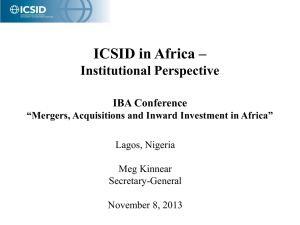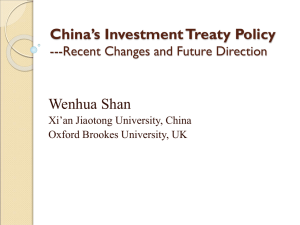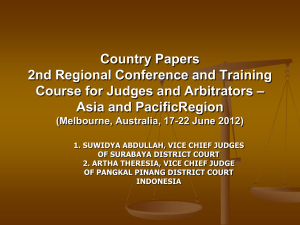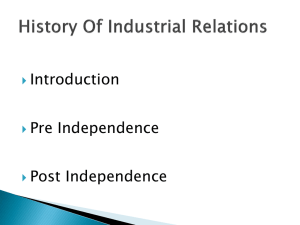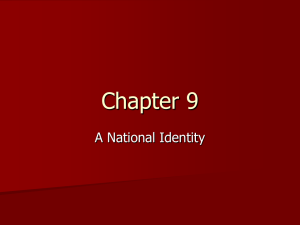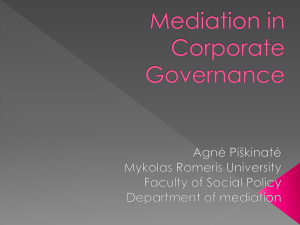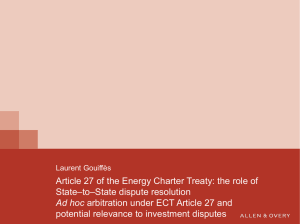Consent - Arbitration Academy
advertisement
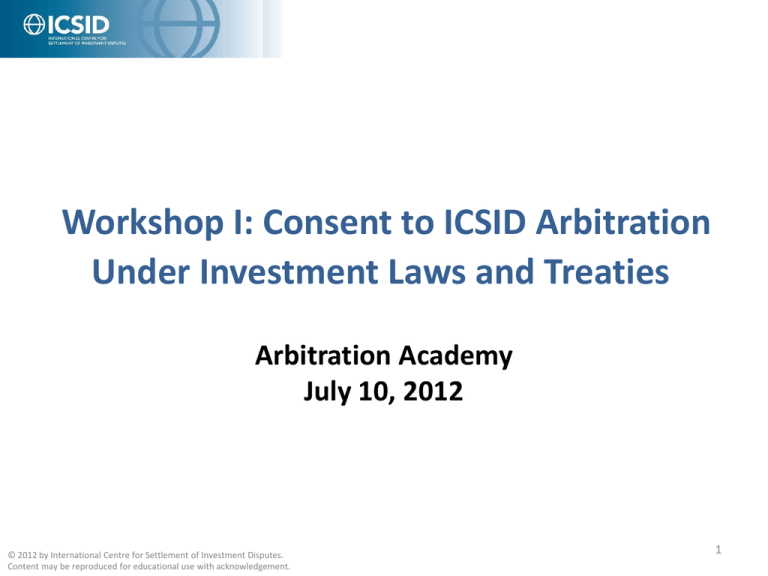
Workshop I: Consent to ICSID Arbitration Under Investment Laws and Treaties Arbitration Academy July 10, 2012 © 2011 by International Centre for Settlement of Investment Disputes. Content may be reproduced for educational use with acknowledgement. © 2012 by International Centre for Settlement of Investment Disputes. Content may be reproduced for educational use with acknowledgement. 1 Conditions for ICSID Jurisdiction Article 25(1) of the ICSID Convention • • • • • Legal Dispute Arising Directly out of an Investment Between Contracting State And National of another Contracting State Consent in Writing © 2012 by International Centre for Settlement of Investment Disputes. Content may be reproduced for educational use with acknowledgement. 2 What is a “Legal Dispute”? • Existence or scope of a legal right or obligation • Cannot be a mere conflict of interest © 2012 by International Centre for Settlement of Investment Disputes. Content may be reproduced for educational use with acknowledgement. 3 What is An “Investment”? Significant undertaking Duration Risk Regularity of profits Contribution to the host State’s Economy © 2012 by International Centre for Settlement of Investment Disputes. Content may be reproduced for educational use with acknowledgement. I will apply the parties’ definition 4 A Contracting State • Must have ratified the ICSID Convention • A subdivision or agency of a Contracting State may be a party if: 1. It has been designated to ICSID (Article 25(1)) 2. The State has approved its consent to arbitration (Article 25(3)) © 2012 by International Centre for Settlement of Investment Disputes. Content may be reproduced for educational use with acknowledgement. 5 A National of Another Contracting State • An individual may not have host State nationality (Article 25(2)(a)) • A company may only have host State nationality if it is under foreign control and the parties have agreed to treat it as a foreign national (Article 25(2)(b)) © 2012 by International Centre for Settlement of Investment Disputes. Content may be reproduced for educational use with acknowledgement. 6 Consent is the Cornerstone of Jurisdiction ICSID Convention Preamble: “[N]o Contracting State shall by the mere fact of its ratification, acceptance or approval of this Convention and without its consent be deemed to be under any obligation to submit any particular dispute to conciliation or arbitration.” © 2012 by International Centre for Settlement of Investment Disputes. Content may be reproduced for educational use with acknowledgement. 7 Requirements for Consent • Must be in Writing • Must be Clear and Explicit • Must Exist at the time the Request for Arbitration is submitted to ICSID © 2012 by International Centre for Settlement of Investment Disputes. Content may be reproduced for educational use with acknowledgement. 8 Sources of Consent • Contracts • Investment Laws • Bilateral Investment Treaties • Multilateral Agreements © 2012 by International Centre for Settlement of Investment Disputes. Content may be reproduced for educational use with acknowledgement. 9 Basis of Consent Invoked to Establish Jurisdiction (end of 2011) Agreement between the United States of America and the Sultanate of Oman on the Establishment of a Free Trade Area (Oman-U.S. FTA) 1% Energy Charter Treaty (ECT) 4% Treaty of Amity and Cooperation in Southeast Asia (ASEAN) 1% North American Free Trade Agreement (NAFTA) 4% Investment Law of the Host-State 6% Investment Contract between the Investor and the Host-State 20% Dominican Republic-United States-Central America Free Trade Agreement (DR-CAFTA) 1% © 2012 by International Centre for Settlement of Investment Disputes. Content may be reproduced for educational use with acknowledgement. Bilateral Investment Treaty (BIT) 63% Example of ICSID Jurisdiction Tokios Tokelės v. Ukraine (ICSID Case No. ARB/02/18) Legal Dispute The dispute concerned an alleged political repression campaign by Ukrainian authorities claimed to have breached the investment protection provisions of the BIT Investment The investment was the Claimant’s subsidiary in Ukraine, a publishing enterprise Contracting States The Respondent was Ukraine Nationality Claimant was a Lithuanian publishing company Consent Consent to ICSID arbitration was contained in the Lithuania/Ukraine BIT © 2012 by International Centre for Settlement of Investment Disputes. Content may be reproduced for educational use with acknowledgement. 11 How Does an ICSID Clause in a Treaty Become “Consent in Writing” to ICSID Arbitration? • State gives consent by concluding the Treaty • The ICSID clause is seen as an “offer” • The covered investor may “accept” the offer, often by submitting the dispute to ICSID • The consent in writing is perfected by the covered investor’s acceptance © 2012 by International Centre for Settlement of Investment Disputes. Content may be reproduced for educational use with acknowledgement. 12 Example of Consent to ICSID Arbitration – AAPL v. Sri Lanka (First ICSID BIT Case) Article 8 of the Sri Lanka-United Kingdom BIT (1) Each Contracting Party hereby consents to submit to the International Centre for the Settlement of Investment Disputes… for settlement by conciliation or arbitration under the Convention on the Settlement of Investment Disputes between States and Nationals of Other States opened for signature at Washington on 18 March 1965 any legal disputes arising between that Contracting Party and a national or company of the other Contracting Party concerning an investment of the latter in the territory of the former. © 2012 by International Centre for Settlement of Investment Disputes. Content may be reproduced for educational use with acknowledgement. 13 Consent Through Host State Legislation • State makes unilateral declaration by adopting national law, e.g. Investment Law • The ICSID clause in law is seen as an “offer” • The covered investor may “accept” the offer, often by submitting the dispute to ICSID • The consent in writing is perfected by the covered investor’s acceptance © 2012 by International Centre for Settlement of Investment Disputes. Content may be reproduced for educational use with acknowledgement. 14 Example of Consent to ICSID Arbitration Investment Law of El Salvador “In the case of disputes arising among foreign investors and the State, regarding their investments in El Salvador, the investors may submit the controversy to: a) The International Centre for Settlement of Investment Disputes (ICSID), in order to settle the dispute by conciliation and arbitration, in accordance with the Convention on Settlement of Investment Disputes Between States and Investors of Other States” (Legislative Decree No. 732, October 14, 1999, Art. 15 (Unofficial Translation)) 15 © 2012 by International Centre for Settlement of Investment Disputes. Content may be reproduced for educational use with acknowledgement. Not All References to ICSID Arbitration in BITs and Investment Laws Amount to Consent – Each Clause Must Be Studied Individually © 2011 by International Centre for Settlement of Investment Disputes. Content may be reproduced for educational use with acknowledgement. 16 Was there a Manifestation of Consent by the State in the BIT/Investment Law? “Nowadays, arbitration is the generally accepted avenue for resolving disputes between investors and states. Yet, that phenomenon does not take away the basic prerequisite for arbitration: an agreement of the parties to arbitrate. It is a wellestablished principle, both in domestic and international law, that such an agreement should be clear and unambigous.” Plama v. Bulgaria, Decision on Jurisdiction of February 8, 2005 © 2011 by International Centre for Settlement of Investment Disputes. Content may be reproduced for educational use with acknowledgement. 17 Scope of Consent Parties may limit the scope of consent by e.g.: • Requirement to exhaust local remedies • Type of disputes covered • Investors covered But Parties cannot expand the scope of consent beyond the ICSID Convention requirements © 2012 by International Centre for Settlement of Investment Disputes. Content may be reproduced for educational use with acknowledgement. 18 Time of Consent Institution Rule 2(3): “‘Date of consent’ means the date on which the parties to the dispute consented in writing to submit it to the Centre; if both parties did not act on the same day, it means the date on which the second party acted.” © 2012 by International Centre for Settlement of Investment Disputes. Content may be reproduced for educational use with acknowledgement. 19 Consequences of Consent • No unilateral withdrawal of consent by either party • No diplomatic protection • No other remedy available – ICSID Convention Arbitration is Exclusive 20 © 2012 by International Centre for Settlement of Investment Disputes. Content may be reproduced for educational use with acknowledgement. Screening of the Request for Arbitration by the Secretary-General Was there Manifestly No Consent? Article 36(3) of the ICSID Convention “The Secretary-General shall register the request unless he finds, on the basis of the information contained in the request, that the dispute is manifestly outside the jurisdiction of the Centre.” © 2012 by International Centre for Settlement of Investment Disputes. Content may be reproduced for educational use with acknowledgement. PART II: Consent to ICSID Jurisdiction: National Investment Laws © 2012 by International Centre for Settlement of Investment Disputes. Content may be reproduced for educational use with acknowledgement. 22 Case Study 1: Egypt Investment Law Article 8 of Law No. 43 Concerning the Investment of Arab and Foreign Funds and the Free Zones (1974) Investment disputes in respect of the implementation of the provisions of this Law shall be settled in a manner to be agreed upon with the investor, or within the framework of the agreements in force between the Arab Republic of Egypt and the investor’s home country, or within the framework of the Convention for the Settlement of Investment Disputes between the State and nationals of other countries to which Egypt has adhered by virtue of Law No. 90 of 1971, where it (i.e., the Convention) applies. 23 © 2012 by International Centre for Settlement of Investment Disputes. Content may be reproduced for educational use with acknowledgement. Case Study 1: Egypt Investment Law Article 8 [continued] • Disputes may be settled through arbitration. An Arbitration Board shall be constituted, comprising a member on behalf of each disputing party and a third member acting as chairman to be jointly named by the two said members. Failing agreement on the nomination of the third member within thirty days of the appointment of the second member, the chairman shall be chosen, at the request of either party, by the Supreme Council of Judicial Bodies from among counsellors of the judiciary in the Arab Republic of Egypt. • The Arbitration Board shall lay down its rules of procedure unrestricted by the rules contained in the Civil and Commercial Code of Procedures, save the rules which relate to the basic guarantees and principles of litigation. The Board shall see to it that the dispute is expeditiously resolved. Awards shall be rendered by majority vote and shall be final and binding on both parties and enforceable as any other final judgment 24 © 2012 by International Centre for Settlement of Investment Disputes. Content may be reproduced for educational use with acknowledgement. Case Study 1: Egypt Investment Law Southern Pacific Properties (Middle East) v. Arab Republic of Egypt (ARB/84/3) Decision on Jurisdiction of April 14, 1988 © 2012 by International Centre for Settlement of Investment Disputes. Content may be reproduced for educational use with acknowledgement. 25 Case Study 1: Egypt Investment Law SPP v. Egypt Was the provision referring to ICSID in the Investment Law capable of constituting consent to jurisdiction? • SPP: Article 8 “establishes a mandatory, hierarchic sequence of dispute resolution procedures” and “if there is no applicable bilateral treaty in force between Egypt and the investor’s State… legal disputes arising directly out of investments must be settled by procedures specified in the Washington Convention if the investor’s State is a party to the Convention” • Egypt: “Article 8 contains no language expressly consenting to the jurisdiction of the Centre and… is nothing more than a nonlimitative list of possible methods of dispute settlement which may be negotiated by the investor and the Egyptian Government on a case-by-case basis” © 2012 by International Centre for Settlement of Investment Disputes. Content may be reproduced for educational use with acknowledgement. 26 Case Study 1: Egypt Investment Law SPP v. Egypt Standard of Interpretation Applied by Tribunal • “…the Tribunal will apply general principles of statutory interpretation taking into consideration, where appropriate, relevant rules of treaty interpretation and principles of international law applicable to unilateral declarations” • “… jurisdictional instruments are to be interpreted neither restrictively nor expansively, but rather objectively and in good faith, and jurisdiction will be found to exist if – but only if – the force of the arguments militating in favor of it are preponderant” © 2012 by International Centre for Settlement of Investment Disputes. Content may be reproduced for educational use with acknowledgement. 27 Case Study 1: Egypt Investment Law SPP v. Egypt Interpretation of Article 8 • Ordinary grammatical meaning of the words “shall be settled” was mandatory on its face, and it was undisputed that Arabic word from which it was translated meant “shall be/will be” • Intent of Law was to give advance consent to ICSID arbitration, among other dispute settlement means, which were in an established hierarchy of available methods from most to least specific • No separate agreement to establish consent needed because it would destroy the internal logic of Article 8 and “render much of that provision superfluous” © 2012 by International Centre for Settlement of Investment Disputes. Content may be reproduced for educational use with acknowledgement. 28 Case Study 1: Egypt Investment Law SPP v. Egypt Tribunal’s Conclusion • “…the Tribunal finds that Article 8 of Law No. 43 establishes a mandatory and hierarchic sequence of dispute settlement procedures, and constitutes an express ‘consent in writing’ to the Centre’s jurisdiction within the meaning of Article 25(1) of the Washington Convention in those cases where there is no other agreed-upon method of dispute settlement and no applicable bilateral treaty.” … “[T]he Tribunal finds that Article 8 of Law No. 43 operates to confer jurisdiction upon the Centre with respect to the Parties’ dispute.” • Advance consent under Article 8 also reported to have been confirmed in decision on jurisdiction in unpublished case Manufacturers Hanover Trust Company v. Egypt, ICSID Case No. ARB/98/1 © 2012 by International Centre for Settlement of Investment Disputes. Content may be reproduced for educational use with acknowledgement. 29 Case Study 1: Egypt Investment Law Article 7 of New Investment Guarantees and Incentives Law (1997) “The investment disputes regarding the implementation of the provisions of this law may be settled in the manner agreed upon with the investor. The parties concerned may also agree to settle such disputes within the framework of the agreements in force between the Arab Republic of Egypt and the country of the investor, or within the framework of the Convention for the Settlement of Disputes arising from investments between States and nationals of other countries, which the Arab Republic of Egypt has adhered to by Law No. 90 of 1971, and pursuant to the conditions, terms and cases where such agreements do apply, or according to the provisions of Law No. 27 of 1994 concerning Arbitration of Civil and Commercial Issues. It may also be agreed to settle said disputes through arbitration before the Cairo Regional Center for International Commercial Arbitration” © 2012 by International Centre for Settlement of Investment Disputes. Content may be reproduced for educational use with acknowledgement. 30 Case Study 2: Venezuela Investment Law Article 22 of Investment Promotion and Protection Law (1999) “Disputes arising between an international investor whose country of origin has in effect with Venezuela a treaty or agreement on the promotion and protection of investments, or disputes to which the provisions of the Convention Establishing the Multilateral Investment Guarantee Agency (OMGI-MIGA) or the Convention on the Settlement of Investment Disputes between States and Nationals of Other States (ICSID) are applicable, shall be submitted to international arbitration according to the terms of the respective treaty or agreement, if it so provides, without prejudice to the possibility of making use, when appropriate, of the dispute resolution means provided for under the Venezuelan legislation in effect.” [English translation]31 © 2012 by International Centre for Settlement of Investment Disputes. Content may be reproduced for educational use with acknowledgement. Case Study 2: Venezuela Investment Law Article 22 Interpreted in 3 ICSID Cases • Mobil Corporation and others v. Bolivarian Republic of Venezuela, ICSID Case No. ARB/07/27, Decision on Jurisdiction of June 10, 2010 • Cemex Caracas Investments B.V. and Cemex Caracas II Investments B.V. v. Bolivarian Republic of Venezuela, ICSID Case No. ARB/08/15, Decision on Jurisdiction of December 30, 2010 • Brandes Investment Partners, LP v. Bolivarian Republic of Venezuela, ICSID Case No. ARB/08/3, Award of August 2, 2011 Issue: Does “if it so provides” language in Article 22 constitute consent to ICSID jurisdiction? 32 © 2012 by International Centre for Settlement of Investment Disputes. Content may be reproduced for educational use with acknowledgement. Case Study 2: Venezuela Investment Law Mobil v. Venezuela Decision on Jurisdiction of June 10, 2010 -andCemex v. Venezuela Decision on Jurisdiction of December 30, 2010 © 2012 by International Centre for Settlement of Investment Disputes. Content may be reproduced for educational use with acknowledgement. 33 Case Study 2: Venezuela Investment Law Mobil v. Venezuela, Cemex v. Venezuela Determining Standard of Interpretation “Legislation and more generally unilateral acts by which a State consents to ICSID jurisdiction must be considered as standing offers to foreign investors under the ICSID Convention. Those unilateral acts must accordingly be interpreted according to the ICSID Convention itself and the rules of international law governing unilateral declarations of States” (Mobil para 85; Cemex para 79) © 2012 by International Centre for Settlement of Investment Disputes. Content may be reproduced for educational use with acknowledgement. 34 Case Study 2: Venezuela Investment Law Mobil v. Venezuela, Cemex v. Venezuela Determining Standard of Interpretation • Article 22 is an act formulated in the framework and on the basis of the ICSID Convention, and not in a State’s exercise of its freedom to act on the international plane. • Therefore, the Tribunal must interpret “the relevant words of a declaration including a reservation contained therein in a natural and reasonable way, having due regard to the intention of the State concerned. That intention can be deduced from the text, but also from the context, the circumstances of its preparation and the purposes intended to be served” (Mobil para 90, 94-95; Cemex para 87) © 2012 by International Centre for Settlement of Investment Disputes. Content may be reproduced for educational use with acknowledgement. 35 Case Study 2: Venezuela Investment Law Mobil v. Venezuela, Cemex v. Venezuela Interpretation of Article 22 – “ambiguous and obscure text.” Tribunal had to “look further” to context – Could not draw from rest of Investment Law, or from Venezuela’s attitude toward arbitration, that Article 22 consented to jurisdiction – No legislative history because it was a decree law, not discussed in Parliament – Publications by drafter, and contemporaneous statements made after proceedings begun – Venezuela’s BITs had clear consent to arbitration, meaning that the State could have expressed the intent clearly in Article 22 if it had wished © 2012 by International Centre for Settlement of Investment Disputes. Content may be reproduced for educational use with acknowledgement. 36 Case Study 2: Venezuela Investment Law Mobil v. Venezuela, Cemex v. Venezuela Tribunals’ Conclusions “The Tribunal thus arrives to the conclusion that such intention is not established. As a consequence, it cannot conclude from the obscure and ambiguous text of Article 22 that Venezuela, in adopting the 1999 Investment Law, consented in advance to ICSID arbitration for all disputes covered by the ICSID Convention. That article does not provide a basis for jurisdiction of the Tribunal in the present case” (Cemex para 138; Mobil para 140) © 2012 by International Centre for Settlement of Investment Disputes. Content may be reproduced for educational use with acknowledgement. 37 Case Study 2: Venezuela Investment Law Brandes v. Venezuela Award of August 2, 2011 © 2012 by International Centre for Settlement of Investment Disputes. Content may be reproduced for educational use with acknowledgement. 38 Case Study 2: Venezuela Investment Law Brandes v. Venezuela, Award Standard of Interpretation • Initial process of interpretation must be conducted within the parameters set by the Republic’s legal system, based on its Political Constitution • Also considered international law to reach a definitive conclusion © 2012 by International Centre for Settlement of Investment Disputes. Content may be reproduced for educational use with acknowledgement. 39 Case Study 2: Venezuela Investment Law Brandes v. Venezuela, Award Interpretation of Article 22 – Text was “confusing and imprecise” – No other provisions of investment law could be read that Article 22 provided consent – Compared to Venezuelan BITs and found they had “clear and precise” consent to ICSID arbitration, unlike Article 22 – Decisions of Venezuelan Supreme Tribunal of Justice and authorities not binding on Tribunal – Additional documentary evidence contained nothing “that may lead it to depart from the conclusions arrived at by those tribunals with respect to the specific matter at issue here” 40 © 2012 by International Centre for Settlement of Investment Disputes. Content may be reproduced for educational use with acknowledgement. PART III: Consent to ICSID Jurisdiction: Bilateral Investment Treaties © 2012 by International Centre for Settlement of Investment Disputes. Content may be reproduced for educational use with acknowledgement. 41 Case Study 1: Rumeli v. Kazakhstan Decision on Jurisdiction of July 29, 2008 [in English] Article VII of the Turkey – Kazakhstan BIT : “[…]the investor and the concerned Party shall endeavor to settle these disputes by consultations and negotiations in good faith. If these disputes cannot be settled in this way within six months following the date of the written notification mentioned in paragraph I, the dispute can be submitted, as the investor may choose, to: (a) (ICSID) (b) an ad hoc court of arbitration under the UNCITRAL Rules (c) the ICC, provided that, if the investor concerned has brought the dispute before the courts of justice of the Party that is a party to the dispute and final award has not been rendered within one year. […]” © 2012 by International Centre for Settlement of Investment Disputes. Content may be reproduced for educational use with acknowledgement. [Emphasis Added, English Version] 42 Case Study 1: Rumeli v. Kazakhstan Decision on Jurisdiction of July 29, 2008 Tribunal’s Conclusion “By contrast with the Turkish version, the English and Russian versions of the Treaty do not require a prior submission of the dispute to local courts before initiation of arbitration proceedings before ICSID. The Arbitral Tribunal considers therefore that no such requirement had to be fulfilled by Claimants before starting this arbitration.” © 2012 by International Centre for Settlement of Investment Disputes. Content may be reproduced for educational use with acknowledgement. 43 Case Study 2: Kilic v. Turkmenistan Decision on Jurisdiction of May 7,2012 Issues identified by the Tribunal: • Need to establish the number of authentic versions of the BIT • Need to establish the correct translation of the Russian version • Does the Vienna Convention on the Laws of Treaties apply and, if so, what provisions? © 2011 by International Centre for Settlement of Investment Disputes. Content may be reproduced for educational use with acknowledgement. 44 Case Study 2: Kilic v. Turkmenistan Decision on Jurisdiction of May 7,2012 Vienna Convention Article 33: “When a treaty has been authenticated in two or more languages, the text is equally authoritative in each language, unless the treaty provides or the parties agree that, in case of a divergence, a particular text shall prevail.” © 2011 by International Centre for Settlement of Investment Disputes. Content may be reproduced for educational use with acknowledgement. 45 Case Study 2: Kilic v. Turkmenistan Decision on Jurisdiction of May 7,2012 Article VII.2 of the Turkey-Turkmenistan BIT provides that an investor may have recourse to international arbitration: “provided that, if the investor concerned has brought the dispute before the courts of justice of the Party that is a party to the dispute and a final award has not been rendered within one year…”. [English version] “on the condition that, if the concerned investor submitted the conflict to the court of the Party, that is a Party to the conflict, and a final arbitral award on compensation of damages has not been rendered within one year.” [First English translation of the Russian version] “on the condition that the concerned investor submitted the conflict to the court of the Party, that is a Party to the conflict, and a final arbitral award on compensation of damages has not been rendered within one year.” [Second English translation of the Russian version] © 2012 by International Centre for Settlement of Investment Disputes. Content may be reproduced for educational use with acknowledgement. 46 Case Study 2: Kilic v. Turkmenistan Decision on Jurisdiction of May 7, 2012 Tribunal’s Conclusion on the Russian “Accurate” Translation “The ordinary meaning of these words in their context and in the light of the object and purpose of the treaty requires the submission of the dispute to local courts prior to the initiation of arbitration proceedings, whether before ICSID, “ad hoc” (in accordance with the UNCITRAL Rules), or before the ICC Court of Arbitration in Paris. © 2012 by International Centre for Settlement of Investment Disputes. Content may be reproduced for educational use with acknowledgement. 47 Case Study 2: Kilic v. Turkmenistan Decision on Jurisdiction of May 7, 2012 Vienna Convention Article 32: “Recourse may be had to supplementary means of interpretation, including preparatory works of the treaty and the circumstances of its conclusion, in order to confirm the meaning resulting from the application of article 31, or to determine the meaning when the interpretation according to article 31: (a) leaves the meaning ambiguous or obscure; or (b) leads to a result which is manifestly absurd or unreasonable.” © 2012 by International Centre for Settlement of Investment Disputes. Content may be reproduced for educational use with acknowledgement. 48 Case Study 2: Kilic v. Turkmenistan Decision on Jurisdiction of May 7, 2012 Tribunal’s Conclusion on the English Version “These circumstances surrounding the conclusion of the BIT lead the Tribunal to conclude that the better view is that the English language version of Article VII.2 is properly to be interpreted as requiring mandatory recourse to the local courts. The Tribunal considered Rumeli v. Kazakhstan but concluded that it was “unpersuasive” because it provided no analysis or reasoning in support of the conclusion. © 2012 by International Centre for Settlement of Investment Disputes. Content may be reproduced for educational use with acknowledgement. 49 Case Study 3: Millicom v. Senegal Decision on Jurisdiction of July 16, 2010 [in French and English] Article 10 of the Netherlands – Senegal BIT: “The Contracting Party in the territory of which a national of the other Contracting Party makes or intends to make an investment shall assent to any request on the part of such national to submit, for arbitration or conciliation, any dispute that may arise in connection with that investment, to the Centre established by the Washington Convention of 18 march 1965 on the settlement of investment disputes between States and nationals of other States.” [English Translation] © 2012 by International Centre for Settlement of Investment Disputes. Content may be reproduced for educational use with acknowledgement. 50 Case Study 3: Millicom v. Senegal Decision on Jurisdiction of July 16, 2010 French original text of Article 10: « La Partie Contractante sur le territoire de laquelle un ressortissant de l'autre Partie Contractante effectue ou envisage d'effectuer un investissement, devra consentir à toute demande de la part de ce ressortissant en vue de soumettre, pour arbitrage ou conciliation, tout différend pouvant surgir au sujet de cet investissement au Centre institué en vertu de la Convention de Washington du 18 mars 1965 pour le règlement des différends relatifs aux investissements entre Etats et ressortissants d'autres Etats. » © 2012 by International Centre for Settlement of Investment Disputes. Content may be reproduced for educational use with acknowledgement. 51 Case Study 3: Millicom v. Senegal Decision on Jurisdiction of July 16, 2010 • Principles of interpretation applied: Vienna Convention Article 31 • Tribunal’s Conclusion: Wording does not give the State discretion to consent “It is prescribed that the State not only “pourra” (“may”) but “devra” (“shall”) give its consent.” © 2012 by International Centre for Settlement of Investment Disputes. Content may be reproduced for educational use with acknowledgement. 52 ICSID 1818 H Street, N.W. Washington, D.C. 20433 USA Tel: (202) 458-1534 Fax:(202) 522-2615 or 522-2027 Website: www.worldbank.org/icsid © 2012 by International Centre for Settlement of Investment Disputes. Content may be reproduced for educational use with acknowledgement. 53
